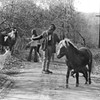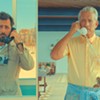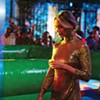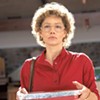Published August 18, 2004 at 6:13 p.m.
Most people don't go to the Montreal World Film Festival to see mainstream movies from the United States. We get plenty of those in our multiplexes. The event, taking place from August 26 to September 6 this year, is better known for European, Canadian, Asian, African and Latin American fare. Much of that will never even reach the art houses here.
So catching any of the 400-plus selections from 72 countries in this year's lineup could qualify as a once-in-a-lifetime experience. No matter how terrific, only a small percentage of them are picked up for release outside their own regions. And short of visiting those regions in person, this festival only 90 miles from Burlington is always a great place for vicarious tourism.
If you've never been to Fiji, for example, Vilsoni Hereniko's The Land Has Eyes might be an enjoyable introduction to that nation's island of Rotuma. There, according to a press release, "a precocious teenager redeems her family's honor by exposing the wrong-doings of a rich and powerful neighbor." Who knew the South Pacific also has precocious teens?
Good Life Delivery, an Argentinean black comedy by Leonardo Di Cesare, centers on a young man in Buenos Aires. His girlfriend moves in with him, bringing her quirky parents and their doughnut business.
Stewart Svaasand's One Last Chance is a caper flick set in rural Scotland, where three friends stumble upon a gold nugget that causes them nothing but trouble.
Like most film festivals, however, this one offers more cinematic conflict than light-hearted subject matter. There's little evidence of Hollywood-like fluff in the global marketplace. So Montreal's make-believe journeys to far-flung lands are often steeped in drama.
Adolescents in Burkina Faso struggle to make a living, as depicted by director Dani Kouyate in Ouaga Saga. Baytong, from Thailand, concerns a Buddhist monk who leaves a remote monastery when his sister is killed in a terrorist attack.
Suburbs, from Slovenia, observes the xenophobic attitudes of middle-aged bowling enthusiasts who spy on some foreigners that move into the neighborhood. In The Crying Wind, a Japanese septuagenarian near Okinawa must contend with the seemingly haunted skull of a kamikaze pilot shot down during World War II.
Peril is a popular theme at the 28th annual gathering in Quebec and history provides fertile ground for exploring the dark side of humanity.
Head in the Clouds is a romantic drama by Brit John Duigan. He focuses on the hedonistic Gilda, played by Oscar-winner Charlize Theron, who shares a Paris apartment with two people -- an Irish teacher (Stuart Townsend) and a Spanish refugee (Penelope Cruz) - who decide to join the fight against fascism in the late 1930s.
Kids in Nazi Germany are at the center of Edelweiss Pirates. Niko von Glasow's feature is about boys in Cologne whose skirmishes with the Hitler Youth and the Gestapo segue from mischievous pranks to outright resistance.
Eric Rohmer's Triple Agent covers a similar time frame with a Hitchcock-like thriller about a Russian man exiled in France. A former officer in the Czar's army, he appears to be a spy.
In addition to Rohmer, who has been working at his craft since the mid-1960s, a number of legendary filmmakers will see their new work showcased at the festival: Ingmar Bergman's Saraband revisits the Swedish couple who sparred three decades ago in the wrenching Scenes From a Marriage. Ettore Scola's People of Rome observes the contemporary populace of that ancient Italian city. Carlos Saura's The 7th Day traces a long-standing blood feud among residents of a small Spanish town. Paul Cox's Human Torch considers the erotic awakening of a thirtysomething woman in Australia who poses nude for an older photographer.
From the personal to the political, the festival is full of opportunities to glimpse cultures that otherwise might not cross our paths. Now that the Bush administration has forbidden us to cross paths with ordinary Cubans, it feels almost rebellious to witness everyday life on the Caribbean island through images, sounds and music captured by Fernando Perez in Suite Habana.
Our current president has also ensured that Iraq is dangerous for civilians. About Baghdad, a documentary, follows a poet named Sinan Antoon as he returns to his embattled native city for the first time in a dozen years.
Americans also tend to steer clear of Iran, where the repressive clergy banned The Lizard. In this satire by Kama Tabrizi, a convicted pickpocket disguises himself as a mullah to escape prison but discovers that his fraudulent life as a religious figure can be a mixed blessing.
In some films at Montreal, danger is represented by an ecological threat or a health crisis: What Sebastian Dreamt, by Rodrigo Rey Rosa, has an environmental perspective. A writer from Spain inherits land in the Guatemalan rainforest only to discover that the locals have been hunting there illegally for generations. Beat the Drum provides a look at the AIDS epidemic in South Africa. Director David Hickson tackles this topic through the eyes of a boy whose family is decimated by the disease.
The pain is strictly psychological in Wicker Park, the tale of an engaged Chicago investment banker (Josh Hartnett) desperately seeking the old flame who broke his heart. This Paul McGuigan film is among a handful of American indies at Montreal, and one of only 20 international entries competing for the top festival prize.
That competitive category includes Around the Bend, by Jordan Roberts. Michael Caine, Christopher Walken and Josh Lucas star as members of an abundantly dysfunctional family. The Lairs reluctantly embark on a trip that proves to be a quest for emotional healing.
Other thorny issues abound. Tying the Knot, a domestic doc by Jim de Seve, scrutinizes the institution of marriage in this age of controversy about same-sex unions. Another nonfiction enterprise -- Louise Lemelin's Restera, Restera Pas? -- spotlights a novice teacher who moves to northern Quebec to educate Inuit children.
Also from Canada and in competition is The Five of Us, about a woman who's unable to embrace happiness until she confronts a dark secret from her past. In this drama by Ghyslaine Cote, the female protagonist organizes a reunion with four old friends at a summer cottage.
Normal people everywhere try to spend late August and early Septem-ber at summer cottages. Only single-minded cineastes would think of squandering what's left of the season in dark movie theaters. At Montreal, many thousands trade seaside vacations for celluloid dreams that can be the antithesis of sunshine and fresh air.
Take My Step-Brother Franken-stein, for example. Valeri Todorov-sky's Russian saga involves a physically and psychically damaged son who returns from fighting in Chechnya to disrupt the life of his middle-class father.
Things are also rather grim in the Middle East. In Jail Girl, by Saad Chraibi, a Moroccan child grows up behind bars because her parents have been incarcerated for their beliefs. And folks in South Korea don't seem much better off. At least that's the premise of Samaritan Girl, Kim Ki-duk's look at a cop whose teenage daughter is moonlighting as a hooker.
Gritty realism on the screen is sometimes eclipsed by glitz when Montreal fêtes various luminaries. This year, actress Isabelle Adjani will be honored. A bit less glamorous, perhaps, are the planned tributes to two veteran filmmakers: Krsto Papic of the former Yugoslavia and Theo Angelopoulos of Greece.
Despite this hoopla, the festival itself may be facing an uncertain future. Two government agencies recently threatened to cut off funding in 2005 if the Montreal extravaganza does not institute major changes. For one thing, there has been a lack of transparency regarding the budget.
But, at a press conference last week, founder-president Serge Losique deflected the media's questions about this dilemma by saying: "We are here to celebrate films!"
Mais oui. Montreal keeps its ethnically diverse audiences satisfied with motion pictures that offer an intricate melting pot of people, places and eras. The medium would have no real power without millions of anonymous devotees in unheralded corners of the planet.
I Love Cinema, by Osama Fawzi, says it all. The picture has ruffled a few Egyptian feathers thanks to its story of a 7-year-old who equates film with heaven. His devout Coptic Christian father believes the boy's passion for the art form is the road to hell.
If so, it's the kind of sin that might make the world a better place.
More By This Author
Speaking of Montreal,
-

Beta Technologies Opens Satellite Office in Montréal
Mar 9, 2023 -

Holiday Shopping for Food in Montréal
Dec 2, 2015 -

Pirate-Themed Ropes Course
Oct 1, 2015 -

Surveying Indian Eats in Montréal
Sep 29, 2015 -

Alice Eats Lebanese Flatbread
Sep 22, 2015 - More »
Comments
Comments are closed.
From 2014-2020, Seven Days allowed readers to comment on all stories posted on our website. While we've appreciated the suggestions and insights, right now Seven Days is prioritizing our core mission — producing high-quality, responsible local journalism — over moderating online debates between readers.
To criticize, correct or praise our reporting, please send us a letter to the editor or send us a tip. We’ll check it out and report the results.
Online comments may return when we have better tech tools for managing them. Thanks for reading.











































